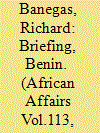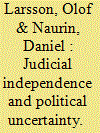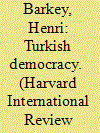|
|
|
Sort Order |
|
|
|
Items / Page
|
|
|
|
|
|
|
| Srl | Item |
| 1 |
ID:
133107


|
|
|
|
|
| Publication |
2014.
|
| Summary/Abstract |
Since 2012, political tension has threatened to undermine Benin's image as a model democracy. The President's efforts to amend the constitution to enable him to contest a third consecutive term, alongside the persecution of some of his former allies, have created a climate of political uncertainty. As a result, a wave of civic protest has gained momentum, a general strike launched in January 2014 lasted for more than four months, and the Catholic Church has broken its silence and denounced the excesses of those in power for the first time since the National Conference in 1990. This Briefing argues that these developments can be considered, on the one hand, as an extension of Benin's passive democratic revolution, a process whereby the co-option of actors from different generations and social strata - the expansion of the "politics of the belly"1 - facilitated the transition from one-party to multi-party rule. On the other hand, the highly volatile situation of the last two years could be said to mark a shift towards a more confrontational scenario of hegemonic rupture in which past agreements on how to share power are torn up by a President determined to capture all economic and political opportunities for himself.
|
|
|
|
|
|
|
|
|
|
|
|
|
|
|
|
| 2 |
ID:
131327


|
|
|
|
|
| Publication |
2014.
|
| Summary/Abstract |
This study presents a framework and models for the analysis of government budget allocation into defense and civilian expenditures in situations of uncertainty about the incidence of war. The models display the intricate relationships between security levels, subjective probabilities of the occurrence of war, and potential war damages. We show that poor countries tend to perceive greater probabilities of war than their richer rivals, and that the psychological burden of insecurity is larger when the country's wealth is larger and when its preference for security is higher. We apply our models to the Israeli-Syrian arms race and show that the higher rate of growth of Israel's gross domestic product relative to that of Syria is expected to lead to an increase in Syria's perception of the likelihood of war and to a decrease in Israel's perception of such a likelihood. We also show that if Syria's regime becomes ideologically more extreme, the monetary cost of maintaining Israel's security at the level that it enjoyed prior to the change will be very high, whereas the monetary cost of maintaining Israel's welfare will be moderate.
|
|
|
|
|
|
|
|
|
|
|
|
|
|
|
|
| 3 |
ID:
147083


|
|
|
|
|
| Summary/Abstract |
There is broad agreement in the literature that international courts (ICs) make decisions with bounded discretion in relation to state governments. However, the scope of this discretion, and the determinants of its boundaries, are highly contested. In particular, the central mechanism in separation-of-powers models of judicial politics—the possibility of legislative override—has raised controversy. We argue that the uncertainty that judges face regarding the political reactions to their decisions has important and undertheorized implications for their behavior. On the one hand, cautious judges are likely to be attentive to signals that contain information about the probability of an unfavorable override. On the other hand, misjudgments of the political risks are likely to be made. Thus, the possibility of override is a significant factor affecting judicial behavior, but it is also a fairly blunt mechanism for balancing the independence and accountability of courts. The empirical study focuses on the Court of Justice of the European Union (CJEU), which has long been at the center of theory development regarding the legalization of world politics and the rise of international courts. The results demonstrate a strong correlation between the CJEU's rulings and the political signals it receives, in a pattern that goes beyond legal merit, and that fits with the override mechanism. State governments are crucial parts of the broader audience that defines the political boundaries of judicial discretion.
|
|
|
|
|
|
|
|
|
|
|
|
|
|
|
|
| 4 |
ID:
132548


|
|
|
|
|
| Publication |
2014.
|
| Summary/Abstract |
Turkey's ruling Justice and Development Party (AKP), or in Turkish, Adalet ve Kalk?nma Partisi, came to power in late 2002 and went to win two more elections in 2007 and 2011, gaining a larger and larger share of the vote. No government since the 1950s had managed to achieve such a feat. A year ago, the AKP and Prime Minister Recep Tayyip Erdogan seemed poised to extend their dominance of Turkish politics for a decade or longer. A year later, however, in the aftermath of protests in early summer and a massive corruption scandal, uncertainty reigns. Erdogan and his party appear to have become unhinged. In fits of complete paranoia, they and their supporters have started to accuse everyone, especially Western allies and interests, for attempting to overthrow them.
Justice and Development Party - AKP
|
|
|
|
|
|
|
|
|
|
|
|
|
|
|
|
|
|
|
|
|